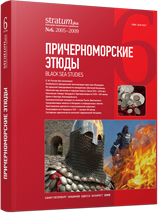Половцы во внутриполитической жизни Византии и Болгарии ХІІІ – ХІV вв.
The Polovtsians in Internal Political Life of Byzantium and Bulgaria in 13-14th Centuries
Author(s): Plamen PavlovSubject(s): History, Middle Ages, 13th to 14th Centuries
Published by: Издательский дом Stratum, Университет «Высшая антропологическая школа»
Keywords: Polovtsians; Byzantium; Bulgaria; Cumans; Golden Horde; Skitikon
Summary/Abstract: The nomad Polovtsians (Cumans) were known as a military force in Byzantium since late 11th century. Their contacts with the Empire, however, became substantially limited after restoration of the Bulgarian Kingdom in 1185, to intensify later only with formation of the Golden Horde. In 1237, about 10,000 families of the Polovtsians got settled in Eastern Thracia, and in 1241 they were sent by Nicaean Emperor to Asia Minor as stratiotai and akritai. They formed a cavalry corps (the so called Skitikon), took part in wars of the Empire in the second half of 13th century. A number of Polovtsian noblemen played important roles in Byzantium’s internal politics in 14th century.The Cumans took even more important place in history of the Second Bulgarian Kingdom, especially in 1185-1207. They first were recruited by the Bulgarians as mercenaries, and after 1237-1241, they massively settled in the country. They became most influential during the reign of George I Terter in Tyrnovo (1280-1292), when the King’s Polovtsian relatives took the most important state functions. Like the Polovtsians in Hungary and Byzantium, they were given status of military colonists. Their Bulgarization was a long process, noblemen playing the leading role in it, and their descendants joined different groupings of Bulgarian nobility according to their interests and social status.
Journal: Stratum plus. Археология и культурная антропология
- Issue Year: 2009
- Issue No: 6
- Page Range: 386-402
- Page Count: 17
- Language: Russian
- Content File-PDF

